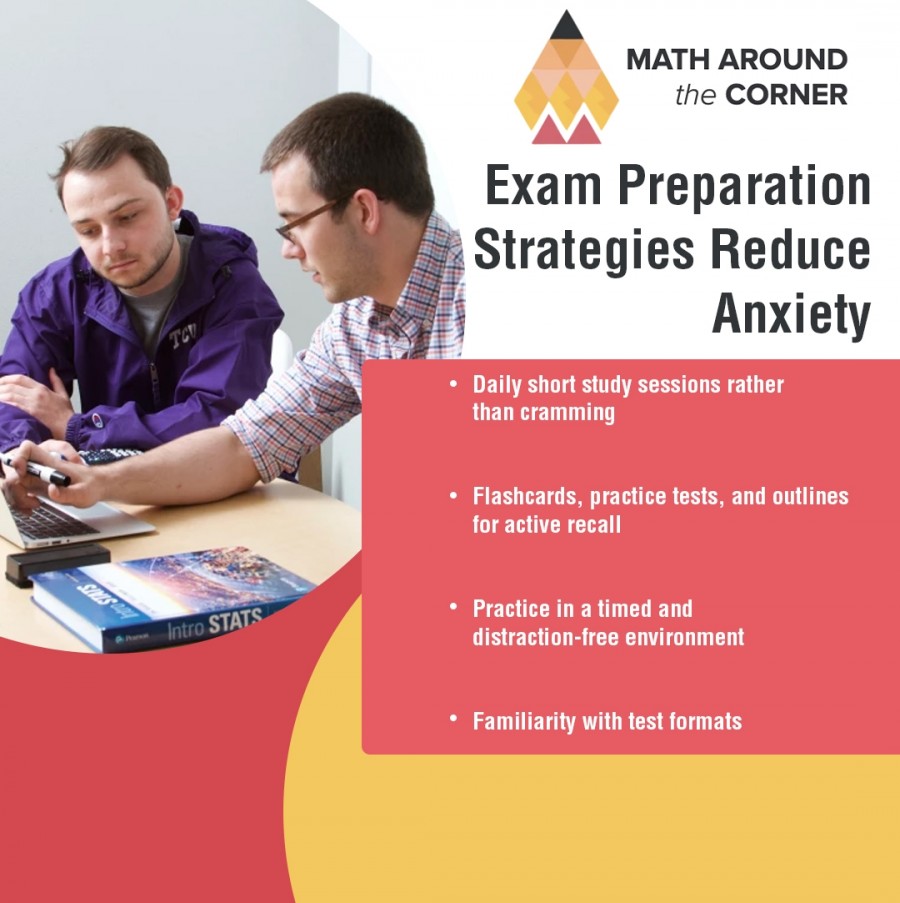Test-Taking Tips to Reduce Anxiety and Improve Scores

At Math Around The Corner (MAC), based in Fort Worth, we understand the challenges students in our community face when preparing for exams. Many students experience test anxiety that interferes with their ability to recall information and perform well, even when they have studied thoroughly. That’s why we focus on providing clear, effective test-taking tips and exam preparation strategies designed to reduce stress and improve scores. Students often understand the material but struggle with test anxiety, time management, and unfamiliar test formats, which can negatively affect their results.
We work closely with parents, educators, and students to develop personalized plans that combine academic review with practical techniques to overcome test anxiety. Our approach emphasizes consistent daily study, simulating test conditions, and prioritizing wellness habits like proper sleep and nutrition. These exam preparation strategies help students build confidence, maintain focus, and perform their best under pressure. By integrating these proven methods, we help students in our community improve their test scores while developing lifelong skills for managing academic stress.
Key Takeaways
Consistent daily review is a proven exam preparation strategy that helps students score higher on tests. Engaging in consistent, daily study sessions can enhance memory retention and alleviate last-minute stress, contributing to improved test performance.
Organizing study materials with outlines and flashcards aligns with effective test-taking tips to improve active recall and understanding. Breaking down content by topic and focusing on key facts helps students overcome test anxiety.
Simulating test conditions is a key exam preparation strategy to build confidence and manage time effectively. Practicing under timed, quiet conditions helps students reduce stress and improve focus during real tests.
Knowing the test format is a vital test-taking tip that guides how to score higher on tests. Customizing study methods for multiple-choice, essay, or short-answer questions enhances preparation and minimizes surprises on test day.
Prioritizing mental and physical wellness is essential to overcome test anxiety and boost test scores. Adequate sleep, balanced nutrition, regular physical activity, and relaxation techniques like deep breathing contribute to reduced anxiety and enhanced cognitive function during tests.
Why Do Students Experience Test Anxiety?
Test anxiety affects focus, memory, and performance.
According to the American Test Anxiety Association, about 16–20% of students experience high test anxiety and another 18% face moderate levels. This widespread issue affects nearly one in every two students. Test anxiety can disrupt memory recall and impair cognitive function, leading to lower scores even when a student has thoroughly prepared. Stress triggers a “fight or flight” response that interferes with focus, making it difficult to access learned information during exams.
We observe these effects regularly in our tutoring sessions at Math Around The Corner. Students who have dedicated hours to studying sometimes struggle once the test starts. Feelings of panic or self-doubt can cause confusion and rush decisions, undermining their ability to demonstrate what they truly know. This gap between preparation and performance highlights the need for effective test-taking tips focused on emotional regulation, not just content mastery.
Because of this, our approach includes teaching students how to overcome test anxiety through practical exam preparation strategies that address both mindset and skill. We train students to recognize early signs of stress and use calming techniques before and during tests. Our goal is to help them stay calm, manage their time well, and apply their knowledge confidently.
Preventing anxiety from overwhelming a student during testing improves outcomes more than last-minute cramming. Building mental resilience and strong habits supports better focus and recall, helping students score higher on tests across all subjects.

How Can I Reduce Test Anxiety Through Preparation?
Early and consistent preparation builds confidence and lowers stress.
We recommend starting at least one to two weeks in advance. Short, daily study sessions help students retain information better than cramming.
Effective Preparation Techniques:
Daily review helps build knowledge steadily and reduces last-minute stress. Studying 20–30 minutes per subject each day reinforces learning and aids long-term retention. For example, a high school student preparing for math might spend 25 minutes reviewing algebra concepts each evening rather than cramming the night before. This consistent approach improves understanding and recall, helping students score higher on tests.
Creating outlines organizes information clearly, making it easier to study efficiently. Organizing notes by topic and subtopic breaks down large amounts of material into manageable sections. For instance, a biology student might outline chapters by systems—like circulatory, respiratory, and nervous—highlighting key processes within each. This method supports deeper comprehension and quicker review during exam prep.
Flashcards are a proven tool to reinforce the memory of critical details. Focusing on key terms, formulas, or dates helps students actively recall information rather than passively rereading notes. For example, a history student can use flashcards for important dates and events, while a chemistry student might review periodic table elements and chemical formulas. This technique aligns with many test-taking tips to strengthen recall.
Simulating test conditions prepares students mentally and physically for the exam environment. Practicing with a timer in a quiet environment simulates real testing pressure, enhancing time management and concentration. A student preparing for a standardized test, like the SAT or ACT, might take full-length practice exams under timed conditions at home. This helps reduce anxiety by making the test feel familiar.
Understanding the test format informs study strategies and reduces surprises on test day. Knowing if the exam is multiple choice, short answer, or essay helps students tailor their preparation. For example, essay exams require practicing writing clear, organized responses, while multiple-choice tests may emphasize recognizing key facts and eliminating wrong answers. This knowledge is a key part of exam preparation strategies that support effective study plans.
These exam preparation strategies reduce fear of the unknown and help students feel in control on test day.
What Role Does Physical and Mental Wellness Play in Exam Prep?
Wellness supports memory, focus, and emotional control during exams.
Physical and mental readiness are just as important as academic review. Here’s what we emphasize:
Wellness Practices That Help:
Taking care of your body and mind is essential to reduce stress and perform well on tests. Consistent routines help regulate emotions, improve focus, and promote mental clarity under pressure.
Sleep is the foundation of clear thinking. Aim for 7–9 hours of sleep each night, especially before a test. Well-rested students process information more accurately and maintain better attention during long exam sessions. Sleep also supports memory consolidation, meaning the information you studied is more likely to stick.
Balanced nutrition stabilizes energy and focus. Choose meals with protein and complex carbohydrates such as whole grains, eggs, lean meats, or nuts. These foods release energy slowly, keeping you alert without crashing. Avoid excess sugar or caffeine, which can lead to jitteriness or energy dips during the test.
Light exercise helps regulate stress. Even a 10-minute walk before a test can reduce cortisol, the hormone linked to anxiety. Movement also boosts blood flow to the brain, which can improve concentration and mental clarity.
Controlled breathing helps shift your body into a calmer state. One simple technique is the 4-7-8 pattern: inhale for four seconds, hold for seven, and exhale slowly for eight. Practicing this for a few minutes can slow your heart rate and clear mental fog.
Positive self-talk trains the brain to manage fear rationally. Instead of saying, “I’m going to fail,” reframe it to “I’ve prepared, and I’ll give it my best.” These affirmations can shift attention from fear to focus. Over time, this mindset builds resilience and confidence.
Integrating these wellness habits into your daily routine—not just on test day—makes it easier to overcome test anxiety and stay centered under pressure. Students who combine review with wellness techniques are more likely to stay focused and calm during tests.
What Are the Best Strategies for Answering Test Questions?
Implementing structured test-taking strategies, such as time management, question prioritization, and process of elimination, can enhance accuracy and boost confidence during exams. During a test, students should prioritize clarity and pacing. We teach the following step-by-step approach:
Key Test-Taking Tips:
Read instructions carefully. Many students lose points by skipping or misinterpreting directions. Taking a moment to understand exactly what is being asked can prevent mistakes such as solving for the wrong variable or writing in the incorrect format. This is especially important in standardized tests and multi-step math or science problems.
Preview the test. Before answering any questions, skim the entire test. Identify how many sections there are and estimate how much time each one requires. This planning step supports better pacing and helps reduce anxiety. Students who preview can allocate more time to sections with higher point values or known difficulty.
Start with easy questions. Answering familiar questions first builds momentum. It also helps students focus on easier points first, increasing their score potential before moving on to more complex problems. This strategy is especially effective in multiple-choice tests and mixed-format exams.
Use the process of elimination. For multiple-choice questions, crossing out clearly incorrect answers boosts the chances of selecting the correct one. Even narrowing it down to two options gives a 50% chance of choosing correctly, which is better than a random guess.
Flag tough questions. Mark challenging problems and move on to avoid wasting time. Revisit these questions after finishing the rest of the test, ideally with a fresh perspective and more time available.
Manage time wisely. Divide the total available time by the number of questions or point value per section. Set mini-deadlines to stay on track, and use any remaining time to review flagged or uncertain answers.
These methods are designed to reduce decision fatigue and support better pacing.
How Do I Stay on Pace During a Timed Test?
Set checkpoints and use question count to stay on schedule.
Time management is a skill we teach across all subjects. Students should divide their total time by the number of questions and set mini-deadlines.
Example:
If a test has 60 minutes and 40 questions, aim to complete 20 questions in 30 minutes.
Tips to Maintain Pace:
Set timers: Use a watch or clock to track progress.
Don’t get stuck: Move on from time-consuming problems.
Return later: Prioritize easier or high-value questions first.
This strategy helps avoid last-minute rushes and incomplete sections.
What Should I Do After a Test to Improve Future Scores?
Review what worked and revise methods based on performance.
Reviewing test results to identify errors and understand misconceptions enables students to adjust their study strategies, leading to improved future performance. Students can follow a structured review process after each major assessment.
Post-Test Actions:
Reflect: Note which strategies helped most.
Review errors: Understand why an answer was incorrect.
Retake practice questions: Rebuild confidence in weak areas.
Reward effort: A short break or small treat reinforces consistency.
This feedback loop builds long-term test skills and reduces anxiety over time.
How Do I Approach Different Types of Test Formats?
Adapting study methods to specific test formats—such as multiple-choice, essay, or problem-solving questions—can enhance preparation efficiency and performance. Our practice sessions are tailored to mimic each format so students become familiar with timing, structure, and common question patterns.
Multiple Choice:
Watch for absolutes ("always," "never")—they’re often incorrect.
Be cautious with "all of the above" and "none of the above" choices.
Essays:
Outline the main ideas before writing.
Stick to one idea per paragraph.
Use clear transitions between points.
Math and Science:
Show all work to catch small mistakes.
Plug answers back into equations when possible.
Label units and use diagrams when allowed.
We adapt these exam preparation strategies based on each student’s curriculum and goals.
What If I Still Feel Anxious Despite Preparation?
Persistent anxiety may need outside support or mindfulness training.
Even with preparation, some students experience physical or emotional stress that affects performance. We address this in several ways:
When Anxiety Persists:
Counseling support: Schools often provide stress management programs.
Mindfulness apps: Some tools offer guided exercises.
Cognitive Behavioral Techniques (CBT): CBT helps identify irrational thoughts and replace them with balanced reasoning.
At Math Around The Corner, we coach students to identify early signs of stress and create response plans that work.
What Data Supports These Test Strategies?
Studies confirm that preparation and pacing reduce test-related stress.
According to the National Institutes of Health, stress can impair cognitive performance, especially on timed exams. The American Psychological Association also reports that mindfulness and breathing techniques can reduce anxiety by lowering heart rate and improving focus.
In our sessions, students who practice timed tests and apply structured strategies report better focus and recall. Many improve test scores within one to two grading periods.
How Do We Support Students at Math Around The Corner?
We build personalized plans to match each student's learning style and test history.
Our one-on-one tutoring model allows us to:
Identify gaps in knowledge or test-taking technique
Customize review schedules based on curriculum and test type
Integrate wellness and pacing tools into each lesson
Track performance data and adjust strategies in real-time
By focusing on test-specific skill-building, we help students learn how to score higher on tests while also improving study habits across subjects.

Frequently Asked Questions
1. What are some effective test-taking tips to improve my exam performance?
At Math Around The Corner, we emphasize effective test-taking tips such as thorough preparation, time management, careful reading of instructions, and practicing under simulated test conditions to help students build confidence and focus.
2. How can I overcome test anxiety before and during exams?
Math Around The Corner advises students on techniques to overcome test anxiety, including deep breathing exercises, getting enough sleep, maintaining balanced nutrition, and using positive self-talk to stay calm during exams.
3. How does daily study help students score higher on tests?
Consistent daily study is one of the key exam preparation strategies we recommend at Math Around The Corner. This approach strengthens retention and reduces last-minute stress, helping students score higher on tests.
4. What should I do if I feel overwhelmed during a test?
Math Around The Corner advises that if you feel overwhelmed, take slow, deep breaths, skip difficult questions temporarily, and return to them later. These test-taking tips help maintain calm and manage exam time effectively.
5. How important is knowing the test format in preparing for exams?
Knowing the test format is critical to tailored preparation. Math Around The Corner guides students to focus on the specific formats they will encounter, enhancing study efficiency as part of effective exam preparation strategies.
Conclusion: What Matters Most for Test Readiness?
Consistent preparation, mental focus, and adaptive strategies reduce anxiety and improve scores.
At Math Around The Corner (MAC), we combine academic coaching with evidence-based methods that help students retain content and perform under pressure. Whether the goal is to raise a grade, qualify for a program, or build confidence, our test-taking tips support every step of the process.
To learn more or enroll with Math Around The Corner, call (817) 720-6284 or email hello@matharoundthecorner.com.
